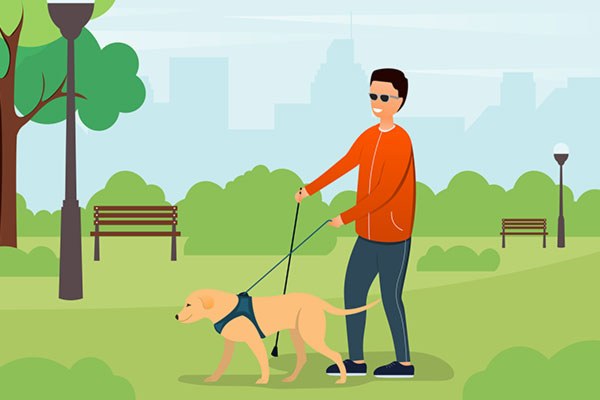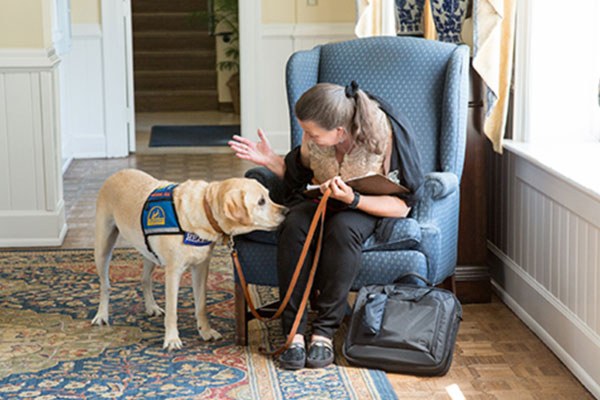How Can Animals Hear Sounds That Humans Cannot
You may take not thought nigh it before—except when you learned near bats in school—but all living creatures have different levels of hearing ability: Some take great hearing, others do not—some don't even use their ears to hear!
Many animals' hearing abilities are more than acute than ours, and each species has a unique way of listening to the earth around it. This includes your pets! Dogs and cats, for example, take a much greater hearing range and focus than humans, so information technology'due south no wonder some are specifically trained to assist those with hearing loss.
The world of beast audiology is fascinating. Nosotros tracked down answers to some of the basic questions about how animals hear, and we're excited to share them with you.
Can Your Pets Accept Hearing Loss? What Causes It?
Similar humans, animals can lose their hearing. As well similar humans, hearing loss or deafness in animals tin be caused past a multifariousness of internal and external factors: nascence defects, genetics, infection, quondam age, trauma, or blockages in the ear. There is ane large deviation, though—they don't know for themselves that things are changing, and even if they did, they would non know how to tell you.
Hearing loss in animals can be built or acquired. Built hearing loss or deafness is present at birth due to genetic inheritance, while acquired hearing loss is caused later in life by trauma, infection, etc. Regardless of when the hearing loss sets in, information technology tin can be classified as either conductive or sensorineural. Conductive hearing loss occurs when the passage of sound is blocked on its way to the inner ear fretfulness. Sensorineural hearing loss, on the other mitt, refers to when nerve receptors cannot transmit sound signals from the ear to either the brain or the brain centers responsible for interpreting audio information.
How Tin can You Tell if Your Pet Has Hearing Loss?
Recognizing the signs of hearing loss in dogs and cats is straightforward. If your pet doesn't respond to squeaky toys, clapping, doorbells, or other loud noises—or if they are difficult to wake up—yous may want to schedule a hearing test with your veterinarian. Y'all might consider similar precautions if your pet is barking or meowing excessively. In addition to providing a diagnosis and creating a treatment programme during your visit, your veterinarian can determine if at that place is blockage—wax aggregating, hair overgrowth, or something else—or an infection causing inflammation to the ear canal or ear pulsate.
Treatment is bachelor to either help restore your dog or cat's hearing or assist him/her in living a long and happy life despite hearing loss.
What Are Some Fun Facts Almost Hearing in Animals?
Elephants
Elephants take large ears, simply hearing is not their strict purpose—primarily, those big, flappy ears act as an air conditioner! Blood flows closely to the ears' surface, cooling it before running through the residuum of the torso doing the same.
Elephants excel in their sensory hearing—that is, hearing through nerve endings and bone conduction in their feet. By pounding their anxiety and creating a vibration barely aural to humans (to us, it sounds like a low rumble), they can hear beyond distances of up to six miles. This long-distance sensory hearing allows herds of elephants to communicate and warn of danger.

Bats
Bats also take a unique way of hearing. Using a technique chosen echolocation, they emit high-frequency noises that bounce off the surrounding environs and back to their ears, substantially creating a map of their environment. Using this map, they tin can locate their prey and "meet" the world around them using sound waves. Since they rely on echolocation to see, they tin can also navigate easily in the dark. Recent scientific studies have as well shown that their auditory system extends to "Merkel cells" located in the footling hair follicles on their wings. These cells are highly sensitive to air movement; they process approaching objects or obstacles and relay relevant information to the brain.
Dolphins
Because sound travels through water faster than air, dolphins have adapted to an echolocation-like style of communication: they emit sonic pulses from their brow, receive the rebounding audio waves with their jawbone, and their auditory nerves so process and relay sound to the brain. Dolphins do take tiny ear holes on the side of their heads, but they aren't very important to their hearing power.

Cats
The furry little feline—perchance perched atop your lap right now—has 32 muscles in his/her ear. Compare that to the 6 in yours! All those muscles give cats the ability to rotate their ears and pinpoint the origin of a sound, granting even lazy housecats excellent hunting skills.
While the boilerplate hearing range for a human is betwixt -xx and +25 decibels, cats can hear upward to 64 kHz (roughly 38 dB), so don't go trying to sneak up on them—they will hear you lot!
Owls
While owls' range of hearing is not much greater than that of a human, their hearing is much more astute, allowing them to focus in on their casualty. The ears on their heads are not parallel either; i sits slightly higher than the other. Equally a result, audio waves arrive at dissimilar times, further improving owls' ability to locate their prey. There is one other bonus advantage to this: while in flight, one ear can hear above them while the other listens beneath—so you can't sneak upwardly on them either!

Can Animals Help You lot with Your Hearing Loss?
You probably already know well-nigh service animals—you've seen them hard at work, guiding the blind and the physically disabled—but did you know that some service dogs are trained specifically to aid people with hearing loss?
You may be asking yourself, "How tin can a service dog help people who are deaf or feel hearing loss?"
Service animals are trained to hear for their owners. Past nudging or pawing at their hard-of-hearing human companions, they alert them to nearby sounds, such equally approaching cars, phone calls, doorbells, alarms, or babies' cries.

How Does Service Fauna Placement Work?
Depending on the agency from which y'all enlist the help of a service fauna, the associated costs may be completely covered by donations. These costs can also climb to over $xx,000 if yous go to agencies similar iv Paws for Ability or Service Dogs for America to work with a fully trained and certified service dog. At that place's no wrong reply, merely information technology'due south important to practise your inquiry before you get also far along in the process with any one organization.
Companies like Canine Companions for Independence (CCI) and Paws With a Cause provides service dogs free of charge to clients in need; however, the qualification process is extremely in-depth and thorough. They volition ask you lot more than questions than a rigorous job interview—if you lot think about it, the dogs really are going to work for you, then this makes sense, and they want to brand sure it is right for all parties. Depending on exactly what you are looking for, it can so take a while earlier you finally get your new companion; training the dogs in their assistive services takes fourth dimension and resources, and some dogs fail out of training throughout the procedure. Only like people and their prospective jobs, not all dogs are up to the task.
What Breeds Make Good Service Dogs?
Paws with a Cause primarily employs Labrador retrievers, gold retrievers, and crosses of the ii breeds; however, they have also trained hypo-allergenic poodles and poodle mixes for those that may have allergies. If big dogs aren't necessarily for you, some smaller breeds can be certified every bit hearing dogs, likewise.

How Can You Qualify to Recruit the Services of a Hearing Domestic dog?
Each service canis familiaris organization may require unlike qualifications, only mostly, you:
- Must exist at least eighteen years old.
- Must be deaf or difficult of hearing—your exact level of hearing loss does non thing, but it must be documented.
- If y'all are deaf and use sign language, CCI provides dogs that are ASL certified.
- Must have adequate plenty vision to proceed an eye on your domestic dog.
- Must be independently mobile—yous must exist able to care for the dog on your own.
If you have done your inquiry and recollect you authorize, you tin request applications directly from each organisation'southward website.
What if You Want to Train Your Own Dog to Hear for Y'all?
Technically you lot can train your canis familiaris to assist you in your hearing loss; however, the process is intense and rigorous, and it should be handled by a professional.
Most people struggle to get their dog to sit and stay, allow lonely hear for them—but in that location are ways to practice it. If yous desire to go the road of doing information technology yourself, AKC has tutorials, only keep in mind that not every dog is cut out for the job. Some pups struggle, even with professional trainers.
How Can CaptionCall Assistance with Your Hearing Loss?
Although we at CaptionCall would love to match you lot with an assistive, hirsuite companion, we unfortunately don't piece of work with hearing dogs. We practise, however, offer another unparalleled service: if you accept hearing loss, and demand captions to use the telephone finer, CaptionCall tin assist you with our no-price captioning service. With the CaptionCall telephone, you can read and hear what your caller is saying then you don't miss whatsoever of the conversation. Yous can too get CaptionCall Mobile and utilize this service on the go. Download the iOS or Android app today.
Your hearing loss doesn't have to agree y'all back—so don't let it.

Source: https://captioncall.com/hearing-health/do-animals-hear-differently-than-humans
Posted by: kellyhishentimed.blogspot.com

0 Response to "How Can Animals Hear Sounds That Humans Cannot"
Post a Comment